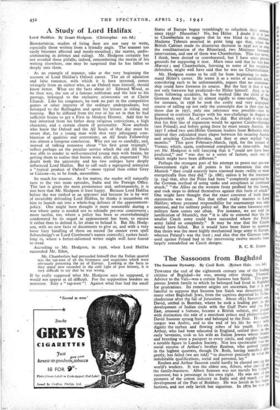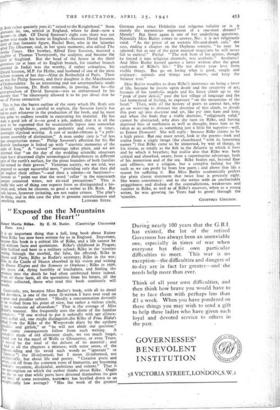The Sassoons from Baghdad
The Sassoon Dynasty. -By Cecil Roth. (Robert Hale. tzs. 6d.) TOWARDS the end of the eikhteenth century oneof the leading citilens of Baghdad—he was, among other things, Finandal Adviser to the Vail—was a certain Sassoon ben Saleh. The pros- perous Jewish family to which he belonged had lived in Baghdad for generations. Its remoter origins are uncertain, but it is not fanciful to suppose that Sassoon ben Saleh was descended, like many other Baghdadi Jews, from the captives deported by Nebu- chadnezzar after tiv fall of Jerusalem. About 1833 Sassoon's son, David, settled in'Bombay, where he took a leading part in the development of Indian trade with the Gulf Ports and the Far East, amassed a fortune, became a British subject, and p.ayed with distinction the role of a merchant prince and philanthrop David Sassoon sprang fm and belonged to the East. His native tongue was Arabic, and to the end of his life he wore with dignity the turban and flowing robes of his youth. His S011, Arthur, who had been educated in England, settled there in the early 'seventies, took as his wife an Italian Jewess whose beaue/ and breeding were a passport to every circle, and rapidly became a notable figure in London Society. Not less spectacular was rile social success of Arthur's brother Reuben, who gained favour in the highest quarters, though Dr. Roth, having searched dili- gently, has failed (we are told) "to discover precisely in what his indubitable qualifications, social and personal, lay." Reuben and Arthur Sassoon could hardly be classed among the world's workers. It was the eldest son, Albert, whz carried on the family-business. Albert Sassoon was not merely his father's successor' but a personage in his own right. He was one of the pioneers of the cotton industry in India and did much for the development of the Port of Bombay. He was lavish in his bene- factions, and not only lavish but sagacious. In 1872 he was r. Roth rather quaintly puts it) "raised to the Knighthood." Soon dreewards he, too, settled in England, where he died—now a Baronet—in 1896. Of David Sassoon's eight sons there was yet another who made his home in England—Sassoon David Sassoon, hither of that fantastic figure, Rachel Beer, who in the 'nineties edited The Observer, and, in her spare moments, also edited The Sunday Times. Her brother, Alfred Ezra Sassoon, married a daughter of Thomas Thornycroft, the sculptor, and became the lather of Siegfried. But the head of the house in the third generation (or at least of its English branch, for another branch remained in India) was the worthy, if rather colourless, Sir Edward Sassoon, M.P. for Hythe, and husband of one of the most brilliant women of her day—Aline de Rothschild of Paris. Their ton was Sir Philip Sassoon, and their daughter is the Marchioness of Chohnondeley. In an interesting and not unsympathetic study of Philip Sassoon, Dr. Roth remarks, in passing, that he—the great-grandson of David Sassoon—was so embarrassed by his worry that "he tiinorously allowed it to be put about that he was of Parsee extraction."
This is but the barest outline of the story which Dr. Roth sets out to tell. As he is careful to explain, the Sassoon family has had no part whatever in the production of' the book, and he must hare gone to endless trouble in excavating his material. He has made a good job of it—so good a job, indeed, that it is all the more to be regretted that he occasionally lapses into somewhat laboured sprightliness, pointless pedantry and even, at times, downright slipshod writing. A row of medal-ribbons is "a poly- chrome assembly of distinction." A man under aixty is "of less than sexagenarian status." Philip Sassoon's affection for his flat ,Kentish landscape is linked up with "atavistic memories of the sands of Iraq." A " mixed " marriage takes place, and we are informed that "on the day of the wedding scientific observers might have discerned slight seismological disturbances in different parts of the earth's surface, for the pious founders of both families had turned in their graves." Victorian society, we are told, was prepared to accept successful men "providing only that they did not neglect their cellars "—and ten a solemn—or facetious?— footnote to "point out that the word ' cellar ' in the nineteenth century connoted wines, not air-raid precautions." This is hardly the sort of thing one expects from so distinguished a his- torian and, when he chooses, so good a writer as Dr. Roth. But such lapses, however irritating, are not major crimes. The play's the thing, and in this case the play is genuine entertainment and



























 Previous page
Previous page